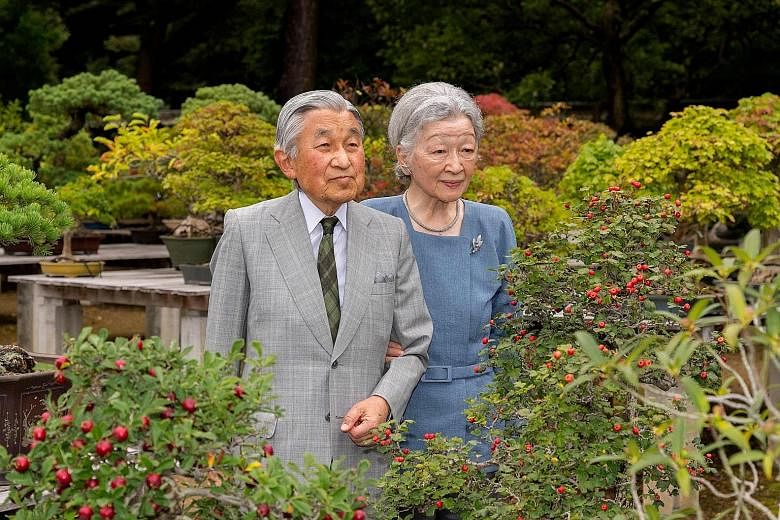TOKYO • The Japanese government yesterday dismissed a report that Emperor Akihito was likely to abdicate at the end of March 2019, the first abdication by a Japanese monarch in nearly two centuries.
The Asahi newspaper, quoting sources, said Crown Prince Naruhito, 57, would ascend the throne in April 2019.
"We are not aware of the report and there is not such fact," Chief Cabinet Secretary Yoshihide Suga, referring to the Asahi report, told a news conference. "We will continue to discuss appropriately and will do our best to carry out the Emperor's abdication smoothly."
In June, Japan's Parliament passed a law allowing Emperor Akihito to abdicate, and the government needs to hammer out the details, including the timing. Asahi claimed the government was in the final stage of formalising the schedule.
Emperor Akihito, 83, who has had heart surgery and treatment for prostate cancer, said in rare public remarks last year that he feared age might make it hard for him to continue to fulfil his duties.
The abdication law, which applies only to Emperor Akihito and not to future emperors, included a resolution to debate letting female royals stay in the imperial family after marriage but did not touch on the controversial topic of allowing women to inherit the throne.
There have also been worries expressed that changing the rule to allow any emperor to abdicate could put Japan's future monarchs at risk of being subject to political manipulation.
Asahi said the expected 2019 abdication schedule would minimise the impact on people in changing to a new imperial reign from the current Heisei Era, which started in 1989 after the death of Emperor Akihito's father, Hirohito, according to the Asahi.
The Imperial Household Agency also wanted the transition to take place in spring 2019 as many ritual events are scheduled for the imperial family in autumn and winter, the report said.
Emperor Akihito, the first Japanese ruler who was never considered divine, has worked for decades at home and abroad to soothe the wounds of World War II which was fought in his father's name.
In written remarks on her 83rd birthday yesterday, Empress Michiko said that she thought her travels this year with Emperor Ahikito around Japan might be their last and have become deeply emotional.
The Empress also said she felt "an immeasurable sense of peace" that Emperor Akihito will be able to rest and spend quiet days after years of pursuit of how the Emperor should be.
REUTERS, AGENCE FRANCE-PRESSE

